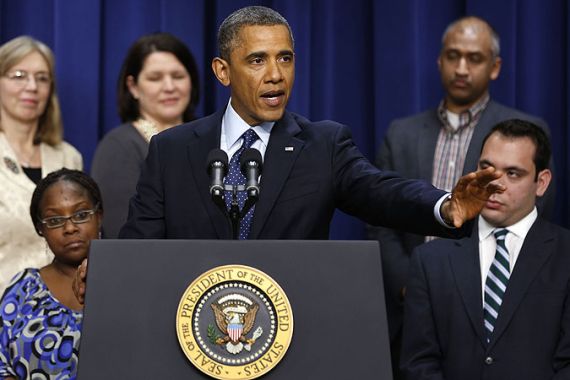US House set to vote on ‘fiscal cliff’ deal
Republican-dominated chamber looks ready to approve bipartisan deal in vote and end months-long dispute.

The US House of Representatives appears set to put an end to the “fiscal cliff” crisis in a vote on a bipartisan deal that aims to prevent another recession in the country.
After a day of deliberation, there appeared to be enough Republicans in the House ready to back a Senate-approved bill in the vote on Tuesday evening, officials have said.
Keep reading
list of 4 itemsBoeing hit with 32 whistleblower claims, as dead worker’s case reviewed
US imposes new sanctions on Iran after attack on Israel
A flash flood and a quiet sale highlight India’s Sikkim’s hydro problems
The measure would raise taxes on the wealthiest Americans and close a crucial chapter of the budget dispute that has consumed Washington for months.
“We’ve gone as far as we can go and I think people are ready to bring it to a conclusion,” Republican Representative Jack Kingston of Georgia said. “We fought the fight”.
David Dreier, the House’s Rules Committee Chairman, predicted the chamber would pass the “fiscal cliff” measure.
He told Reuters news agency that he expected it to pass with bipartisan support, but declined to guess how many Republicans would back it, other than to say: “Quite a few”.
Al Jazeera’s John Terrett, reporting from Washington, said that the House will likely pass the bill, but with many Republicans resisting it.
“The feeling in the building is that this is going to pass into law,” he said.
‘Republican revolt’
“But I know there is going to be a lot of revolt among Republicans in the House of Representatives because they have been very angry ever since the Senate approved the bill…They think that there are not enough spending cuts in the bill.”
“So I think you are going to see many Republicans voting against it.”
“But when you add the Democrats who will obviously vote in favor and the Republicans who we think will vote in favor, there is enough to carry in the day.”
| Economics expert discusses impacts of ‘fiscal cliff’ |
The developments came after the House decided to not alter the bill, which would have complicated congressional passage of the measure.
Senate Democratic aides have said the Democratic-led Senate, which overwhelmingly approved a compromise early on Tuesday, would not return to vote on an amended version of the bill.
The measure would allow tax increases on the highest-earning Americans, but retain decade-old income tax cuts for everyone else.
The Senate approved legislation aimed at averting the “fiscal cliff” by stopping most tax hikes and across-the-board spending cuts that were due to begin with the new year.
The deal was approved early on Tuesday, about two hours after the midnight deadline at which the automatic tax hikes and spending cuts came into effect.
Under the Senate plan, those with a household income above $450,000 or individual income above $400,000 would be taxed at 39.6 percent, up from 35 percent.
“The Democrats who are also pretty upset with this bill, but for different reasons,” Terrett said.
“For instance, they thought the threshold for rich people paying taxes of $400,000 was far too high. They thought Obama should have stuck to the campaign figure of $250,000.”
Balance of cuts
Republicans, who control the House of Representatives, have been against raising taxes on the rich, while the Democrat-controlled Senate and the White House have been averse to spending cuts.
The agreement includes a balance of spending cuts and revenue increases to pay for the delay in the automatic spending cuts that would go into effect without a deal.
Of those spending cuts, 50 percent would come from defence and 50 percent from non-defence areas.
President Barack Obama said on Monday that the deal would extend unemployment benefits for Americans “who are still out there looking for a job”.
Without a deal, the nation could lose up to 3.4 million jobs, the Congressional Budget Office has predicted, while budget cuts of up to nine percent could hit most of the federal government.
Meanwhile, the country’s chronic deficit spending – about $1 trillion a year – continues without a deal to address it.
If the limit were not raised on how much the government can borrow, reaching the $16.4 trillion debt ceiling could lead to a first-ever default in February or March that would shake worldwide confidence in the US.
The current Congress is in session only through mid-day on January 3. After that, a freshly elected Congress with 13 new senators and 82 new House members will inherit the problem.